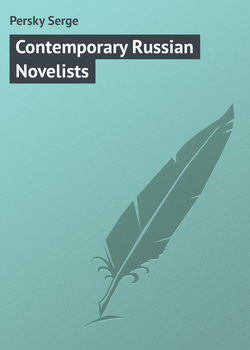Contemporary Russian Novelists

Реклама. ООО «ЛитРес», ИНН: 7719571260.
Оглавление
Persky Serge. Contemporary Russian Novelists
PREFACE
I. A BRIEF SURVEY OF RUSSIAN LITERATURE
II. ANTON TCHEKOFF2
III. VLADIMIR KOROLENKO
IV. VIKENTY VERESSAYEV
V. MAXIM GORKY
VI. LEONID ANDREYEV
VII. DMITRY MEREZHKOVSKY
VIII. ALEXANDER KUPRIN
IX. WRITERS IN VOGUE
Отрывок из книги
In order to get a clear idea of modern Russian literature, a knowledge of its past is indispensable. This knowledge will help us in understanding that which distinguishes it from other European literatures, not only from the viewpoint of the art which it expresses, but also as the historical and sociological mirror of the nation's life in the course of centuries.
The dominant trait of this literature is found in its very origins. Unlike the literatures of other European countries, which followed, in a more or less regular way, the development of life and civilization during historic times, Russian literature passed through none of these stages. Instead of being a product of the past, it is a protestation against it; instead of retracing the old successive stages, it appears, intermittently, like a light suddenly struck in the darkness. Its whole history is a long continual struggle against this darkness, which has gradually melted away beneath these rays of light, but has never entirely ceased to veil the general trend of Russian thought.
.....
All the celebrated writers of Europe who professed liberal tendencies met with a greater sympathy among the Russians of that time than in their own country. Dickens, received with great enthusiasm in Russia, was not appreciated by the English public. His excellent translator, Vedensky, tried hard to persuade him to come to Russia to live, where his talents would be valued at their true worth. We can then readily understand how Dostoyevsky, in his "Memoirs of an Author," had the right to say that the European socialistic-democrats had two countries, first their own, then Russia.
The Russian writers who gave themselves up so passionately to this influence, – still so new even in Europe, – not able to support their political ideal, with a press, as it were, gagged by the censor, engaged in the struggle along the line of customs. They attacked the prejudices which clog the relations among men, and rose up against family despotism and the inferior position of women from a civil and economic point of view. But, between 1860 and 1870, when the enfranchisement of the serfs reduced the power of the censor, all that had been confined in the souls of the Russians burst forth. Chernishevsky wrote economic articles on capital and on the agricultural community; he studied the system of John Stuart Mill, from which he deduced his socialistic conclusions, and his reputation grew immediately at home and abroad. He became a leader of thought among the new generation.
.....